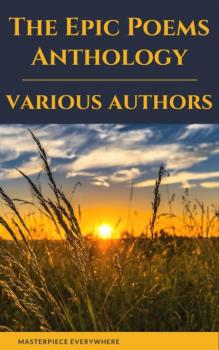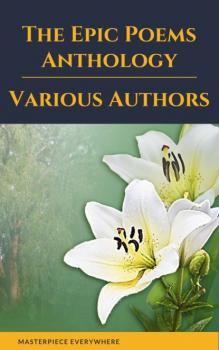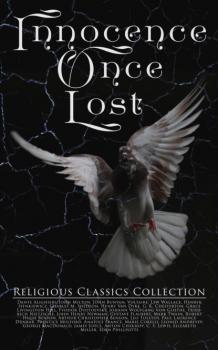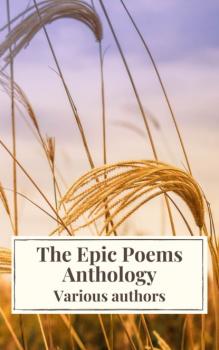ТОП просматриваемых книг сайта:
Джон Мильтон
Список книг автора Джон МильтонАннотация
Anthology of Epic Poems, is a collection of epic poems collected for you with a Active table of contents, to make reading more enjoyable.
This collection includes:
–The Iliad and The Odyssey by Homer –The Aeneid, by Virgil –The Divine Comedy, by Dante Alighieri –Venus and Adonis, by William Shakespeare –Paradise Lost and Paradise Regained, by John Milton
This collection includes:
–The Iliad and The Odyssey by Homer –The Aeneid, by Virgil –The Divine Comedy, by Dante Alighieri –Venus and Adonis, by William Shakespeare –Paradise Lost and Paradise Regained, by John Milton
Аннотация
"Tuer un homme, c'est détruire une créature raisonnable ; mais étouffer un bon livre c'est tuer la raison elle-même. On ne peut pas regarder la censure des livres comme une méthode dictée par la sagesse ; car, si c'était un moyen sage, il faudrait l'appliquer à tout ; il n'y aurait pas de raison pour qu'on s'en servit pour les livres, plutôt que pour toute autre chose ; c'est là sans doute une invincible démonstration que ce moyen n'est bon à rien"
Dans ce pamphlet resté célèbre, Milton réclame l'abrogation du Licensing Order promulgué par le Parlement d'Angleterre en juin 1643. Cette ordonnance instaurait une censure et prohibait l'impression de livres jugés contraires à la religion, au gouvernement et au bonheur de la nation toute entière. C'est ainsi contre une atteinte sévère à la liberté d'expression que Milton s'exprime, en déployant un argumentaire à la fois historique et philosophique qui, point par point, vise à démontrer l'inutilité et la dangerosité de cette inquisition.
Cette édition est agrémentée d'une préface inédite et propose aux lecteurs une mise en page soignée destinée à rendre la lecture confortable.
Dans ce pamphlet resté célèbre, Milton réclame l'abrogation du Licensing Order promulgué par le Parlement d'Angleterre en juin 1643. Cette ordonnance instaurait une censure et prohibait l'impression de livres jugés contraires à la religion, au gouvernement et au bonheur de la nation toute entière. C'est ainsi contre une atteinte sévère à la liberté d'expression que Milton s'exprime, en déployant un argumentaire à la fois historique et philosophique qui, point par point, vise à démontrer l'inutilité et la dangerosité de cette inquisition.
Cette édition est agrémentée d'une préface inédite et propose aux lecteurs une mise en page soignée destinée à rendre la lecture confortable.
Аннотация
Anthology of Epic Poems, is a collection of epic poems collected for you with a Active table of contents, to make reading more enjoyable.
This collection includes:
–The Iliad and The Odyssey by Homer –The Aeneid, by Virgil –The Divine Comedy, by Dante Alighieri –Venus and Adonis, by William Shakespeare –Paradise Lost and Paradise Regained, by John Milton
This collection includes:
–The Iliad and The Odyssey by Homer –The Aeneid, by Virgil –The Divine Comedy, by Dante Alighieri –Venus and Adonis, by William Shakespeare –Paradise Lost and Paradise Regained, by John Milton
Аннотация
Paradise Lost – John Milton – Paradise Lost is an epic poem in blank verse by the 17th-century English poet John Milton. It was originally published in 1667 in ten books; a second edition followed in 1674, redivided into twelve books (in the manner of the division of Virgil's Aeneid) with minor revisions throughout and a note on the versification. The poem concerns the Judeo-Christian story of the Fall of Man; the temptation of Adam and Eve by the fallen angel Satan and their expulsion from the Garden of Eden. Milton's purpose, stated in Book I, is «justify the ways of God to men» and elucidate the conflict between God's eternal foresight and free will.
Аннотация
Este ebook presenta «El Paraíso Perdido (texto completo, con índice activo)» con un sumario dinámico y detallado. El Paraiso Perdido (Paradise Lost) de John Milton es un poema epico, publicado en 1667. Cuenta la historia de la rebelión de Satanás contra Dios, su expulsión del cielo junto con el resto de los ángeles rebeldes, y la forma en que tentó a Adán y Eva a comer del fruto prohibido y la caída de la gracia. Fundamentalmente trata el tema del problema del mal y el sufrimiento del hombre, con el fin de responder a una simple pregunta: ¿Cómo un Dios bueno y todo poderoso decide como, cuando y donde le seria más facil evitar estos problemas? John Milton (1608-1674), poeta y ensayista singular, políglota y de esmerada educación clásica, es uno de los más grandes escritores en lengua inglesa. Vivió uno de los periodos más convulsos de la historia de Inglaterra: la Guerra Civil, la República de Cromwell y la restauración monárquica, todo ello en las décadas centrales del siglo XVII.
Paradise Lost + Paradise Regained (2 Unabridged Classics + Original Illustrations by Gustave Doré) - Джон Мильтон
Аннотация
This carefully crafted ebook: «Paradise Lost + Paradise Regained (2 Unabridged Classics + Original Illustrations by Gustave Doré)» is formatted for your eReader with a functional and detailed table of contents. Paradise Lost is an epic poem in blank verse by the 17th-century English poet John Milton (1608-1674). It was originally published in 1667 in ten books, with a total of over ten thousand individual lines of verse. It is considered by critics to be Milton's «major work», and the work helped to solidify his reputation as one of the greatest English poets of his time. The poem concerns the Biblical story of the Fall of Man: the temptation of Adam and Eve by the fallen angel Satan and their expulsion from the Garden of Eden. Milton's purpose, stated in Book I, is to «justify the ways of God to men». Paradise Regained is a poem by Milton, published in 1671. It is connected by name to his earlier and more famous epic poem Paradise Lost, with which it shares similar theological themes. It deals with the subject of the temptation of Christ. John Milton (1608 – 1674) was an English poet, polemicist, a scholarly man of letters, and a civil servant for the Commonwealth of England under Oliver Cromwell. Milton's poetry and prose reflect deep personal convictions, a passion for freedom and self-determination, and the urgent issues and political turbulence of his day.
Аннотация
e-artnow presents to you this meticulously edited cothe collection of the world's greatest novels and stories with religious theme and spiritual messages: Divine Comedy (Dante Alighieri) Paradise Lost (John Milton) The Pilgrim's Progress (John Bunyan) Zadig (Voltaire) Ben-Hur: A Tale of the Christ (Lew Wallace) Quo Vadis (Henryk Sienkiewicz) In His Steps (Charles M. Sheldon) The Story of the Other Wise Man (Henry Van Dyke) The Ball and the Cross (G. K. Chesterton) The Enchanted Barn (Grace Livingston Hill) The Grand Inquisitor (Fyodor Dostoevsky) Thus Spoke Zarathustra (Friedrich Nietzsche) Faust (Johann Wolfgang von Goethe) The Holy War (John Bunyan) Callista: A Tale of the Third Century (John Henry Newman) Martyr of the Catacombs: A Tale of Ancient Rome (James De Mille) The Temptation of St. Anthony (Gustave Flaubert) Personal Recollections of Joan of Arc (Mark Twain) Lord of the World (Robert Hugh Benson) The Child of the Dawn (Arthur Christopher Benson) Where Love is There God is Also (Leo Tolstoy) Loss and Gain: The Story of a Convert (John Henry Newman) The Uncalled (Paul Laurence Dunbar) The Swamp Angel (Prentice Mulford) The Revolt of the Angels (Anatole France) The Mysterious Stranger (Mark Twain) The Sorrows of Satan (Marie Corelli) Satan's Diary (Leonid Andreyev) Lilith (George MacDonald) Grace (James Joyce) The Student (Anton Chekhov)
Аннотация
e-artnow presents to you this unique collection with carefully picked out novels and short stories dealing with themes such as the presence of god, religion, theology and spirituality. Table of Contents: Divine Comedy (Dante Alighieri) Paradise Lost (John Milton) The Pilgrim's Progress (John Bunyan) Zadig (Voltaire) Ben-Hur: A Tale of the Christ (Lew Wallace) Quo Vadis (Henryk Sienkiewicz) In His Steps (Charles M. Sheldon) The Story of the Other Wise Man (Henry Van Dyke) The Ball and the Cross (G. K. Chesterton) The Enchanted Barn (Grace Livingston Hill) The Grand Inquisitor (Fyodor Dostoevsky) Thus Spoke Zarathustra (Friedrich Nietzsche) Faust (Johann Wolfgang von Goethe) The Holy War (John Bunyan) Callista: A Tale of the Third Century (John Henry Newman) Martyr of the Catacombs: A Tale of Ancient Rome (James De Mille) The Temptation of St. Anthony (Gustave Flaubert) Personal Recollections of Joan of Arc (Mark Twain) Lord of the World (Robert Hugh Benson) The Child of the Dawn (Arthur Christopher Benson) Where Love is There God is Also (Leo Tolstoy) Loss and Gain: The Story of a Convert (John Henry Newman) The Uncalled (Paul Laurence Dunbar) The Swamp Angel (Prentice Mulford) The Revolt of the Angels (Anatole France) The Mysterious Stranger (Mark Twain) The Sorrows of Satan (Marie Corelli) Satan's Diary (Leonid Andreyev) Lilith (George MacDonald) Grace (James Joyce) The Student (Anton Chekhov) The Screwtape Letters (C. S. Lewis) The Great Divorce (C. S. Lewis) Saul of Tarsus (Elizabeth Miller) A Deal with the Devil (Eden Phillpotts)
Аннотация
Anthology of Epic Poems, is a collection of epic poems collected for you with a Active table of contents, to make reading more enjoyable.
This collection includes:
–The Iliad and The Odyssey by Homer –The Aeneid, by Virgil –The Divine Comedy, by Dante Alighieri –Venus and Adonis, by William Shakespeare –Paradise Lost and Paradise Regained, by John Milton
This collection includes:
–The Iliad and The Odyssey by Homer –The Aeneid, by Virgil –The Divine Comedy, by Dante Alighieri –Venus and Adonis, by William Shakespeare –Paradise Lost and Paradise Regained, by John Milton
Аннотация
( newly updated TOC )
The Harvard Universal Classics, originally known as Dr. Eliot's Five Foot Shelf, is a 51-volume anthology of classic works from world literature, compiled and edited by Harvard University president Charles W. Eliot and first published in 1909.
Eliot had stated in speeches that the elements of a liberal education could be obtained by spending 15 minutes a day reading from a collection of books that could fit on a five-foot shelf. (Originally he had said a three-foot shelf.) The publisher P. F. Collier and Son saw an opportunity and challenged Eliot to make good on this statement by selecting an appropriate collection of works, and the Harvard Classics was the result.
Eliot worked for one year with William A. Neilson, a professor of English; Eliot determined the works to be included and Neilson selected the specific editions and wrote introductory notes. Each volume had 400–450 pages, and the included texts are «so far as possible, entire works or complete segments of the world's written legacies.» The collection was widely advertised by Collier and Son, in Collier's and elsewhere, with great success.
Eight years later Eliot added a further 20 volumes as a sub-collection titled 'The Harvard Classics Shelf of Fiction', offering some of the greatest novels and short stories of world literature. The exhaustive anthology of the 'The Harvard Classics' comprises every major literary figure, philosopher, religion, folklore and historical subject up to the twentieth century.
The Harvard Classics: . 1: Franklin, Woolman & Penn 2: Plato, Epictetus & Marcus Aurelius 3: Bacon, Milton, Browne 4: John Milton 5: R. W. Emerson 6: Robert Burns 7: St Augustine & Thomas á Kempis 8: Nine Greek Dramas 9: Cicero and Pliny 10: The Wealth of Nations 11: The Origin of Species 12: Plutarchs 13: Æneid 14: Don Quixote 15: Bunyan & Walton 16: 1001 Nights 17: Folklore & Fable 18: Modern English Drama 19: Goethe & Marlowe 20: The Divine Comedy 21: I Promessi Sposi 22: The Odyssey 23: Two Years Before the Mast 24: Edmund Burke 25: J. S. Mill & T. Carlyle 26: Continental Drama 27 & 28: English & American Essays 29: The Voyage of the Beagle 30: Scientific Papers 31: The Autobiography of Benvenuto Cellini 32: Literary and Philosophical Essays 33: Voyages & Travels 34: French & English Philosophers 35: Chronicle and Romance 36: Machiavelli, Roper, More, Luther 37: Locke, Berkeley, Hume 38: Harvey, Jenner, Lister, Pasteur 39: Prologues 40–42: English Poetry 43: American Historical Documents 44 & 45: Sacred Writings 46 & 47: Elizabethan Drama 48: Blaise Pascal 49: Saga 50: Reader's Guide 51: Lectures The Shelf of Fiction: 1 & 2: The History of Tom Jones 3: A Sentimental Journey & Pride and Prejudice 4: Guy Mannering 5 & 6: Vanity Fair 7 & 8: David Copperfield 9: The Mill on the Floss 10: Irving, Poe, Harte, Twain, Hale 11: The Portrait of a Lady 12: Notre Dame de Paris 13: Balzac, Sand, de Musset, Daudet, de Maupassant 14 & 15: Goethe, Keller, Storm, Fontane 16–19: Tolstoy, Dostoevsky, Turgenev 20: Valera, Bjørnson, Kielland
The Harvard Universal Classics, originally known as Dr. Eliot's Five Foot Shelf, is a 51-volume anthology of classic works from world literature, compiled and edited by Harvard University president Charles W. Eliot and first published in 1909.
Eliot had stated in speeches that the elements of a liberal education could be obtained by spending 15 minutes a day reading from a collection of books that could fit on a five-foot shelf. (Originally he had said a three-foot shelf.) The publisher P. F. Collier and Son saw an opportunity and challenged Eliot to make good on this statement by selecting an appropriate collection of works, and the Harvard Classics was the result.
Eliot worked for one year with William A. Neilson, a professor of English; Eliot determined the works to be included and Neilson selected the specific editions and wrote introductory notes. Each volume had 400–450 pages, and the included texts are «so far as possible, entire works or complete segments of the world's written legacies.» The collection was widely advertised by Collier and Son, in Collier's and elsewhere, with great success.
Eight years later Eliot added a further 20 volumes as a sub-collection titled 'The Harvard Classics Shelf of Fiction', offering some of the greatest novels and short stories of world literature. The exhaustive anthology of the 'The Harvard Classics' comprises every major literary figure, philosopher, religion, folklore and historical subject up to the twentieth century.
The Harvard Classics: . 1: Franklin, Woolman & Penn 2: Plato, Epictetus & Marcus Aurelius 3: Bacon, Milton, Browne 4: John Milton 5: R. W. Emerson 6: Robert Burns 7: St Augustine & Thomas á Kempis 8: Nine Greek Dramas 9: Cicero and Pliny 10: The Wealth of Nations 11: The Origin of Species 12: Plutarchs 13: Æneid 14: Don Quixote 15: Bunyan & Walton 16: 1001 Nights 17: Folklore & Fable 18: Modern English Drama 19: Goethe & Marlowe 20: The Divine Comedy 21: I Promessi Sposi 22: The Odyssey 23: Two Years Before the Mast 24: Edmund Burke 25: J. S. Mill & T. Carlyle 26: Continental Drama 27 & 28: English & American Essays 29: The Voyage of the Beagle 30: Scientific Papers 31: The Autobiography of Benvenuto Cellini 32: Literary and Philosophical Essays 33: Voyages & Travels 34: French & English Philosophers 35: Chronicle and Romance 36: Machiavelli, Roper, More, Luther 37: Locke, Berkeley, Hume 38: Harvey, Jenner, Lister, Pasteur 39: Prologues 40–42: English Poetry 43: American Historical Documents 44 & 45: Sacred Writings 46 & 47: Elizabethan Drama 48: Blaise Pascal 49: Saga 50: Reader's Guide 51: Lectures The Shelf of Fiction: 1 & 2: The History of Tom Jones 3: A Sentimental Journey & Pride and Prejudice 4: Guy Mannering 5 & 6: Vanity Fair 7 & 8: David Copperfield 9: The Mill on the Floss 10: Irving, Poe, Harte, Twain, Hale 11: The Portrait of a Lady 12: Notre Dame de Paris 13: Balzac, Sand, de Musset, Daudet, de Maupassant 14 & 15: Goethe, Keller, Storm, Fontane 16–19: Tolstoy, Dostoevsky, Turgenev 20: Valera, Bjørnson, Kielland










